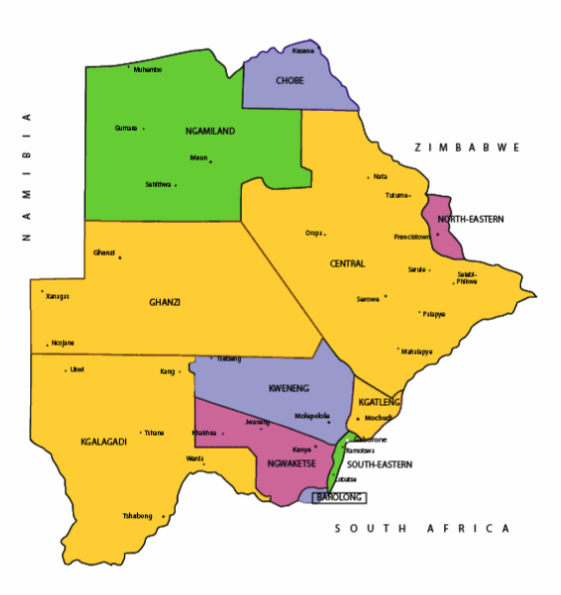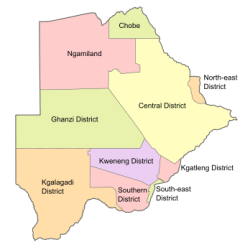Places and their polling stations in Mochudi East, Botswana
239 Bokaa
1177 Raditladi Primary School
1178 Bokaa Community Hall
1179 Bokaa Kgotla (Tent)
1180 Mmamashia Water Treatment Plant (Tent)
1181 Tlhaakgame Primary School
240 Matebele
1182 Matebele Primary School
1183 Ramodibe Mobile Stop (Tent)
1184 Matebele Community Hall
241 Oodi
1185 Oodi Primary School
1186 Oodima JSS
1187 Oodi Weavers
1188 Oodi College of Applied Arts And Technology
242 Modipane
1189 Modipane Primary School
1190 Dikwididi Primary School
1191 Mokatse Kgotla (Tent)
1192 Mokatsana VDC (Tent)
243 Sikwane-Mabalane
1193 Sikwane Primary School
1194 Mabalane Primary School
1195 Sikwane Agriculture Office (Tent)
1196 Mabalane Dutch Reformed Church
244 Mmathubudukwane-Ramonaka
1197 Letsebe Primary School
1198 Commerce House (Tent)
1199 Ramonaka Primary School
1200 Dikalakane (Tent)
245 Malolwane
1201 Rankoa Primary School
1202 Matlou Kgotla (Tent)
1203 Motlhabane Kgotla (Tent)
1204 Deep Level (Tent)
1205 Bodiakhudu Lands (Tent)
246 Oliphant’s Drift-Ramotlabaki
1206 Ramotlabaki Primary School
1207 Palla Camp (Tent)
1208 Oliphant’s Drift Primary School
247 Boseja North
1209 Education Centre
1210 Lady Mitchinson Primary School
1211 Boseja North Kgotla
1212 International Pentecostal Church
248 Boseja Central
1213 Boseja Central Kgotla (Tent)
1214 Sedibelo JSS
1215 Assemblies of God Church
249 Boseja South
1216 Kgafela Primary School
1217 Radikolo JSS
1218 International Church
1219 Matlhage Agriculture Office (Tent)
1220 Saint Faith Church
Reference: iec.gov.bw/index.php/electoral-districts/polling-stations.html
Botswana
Botswana is a country in Africa. It is topographically flat, with approximately 70 percent of its territory being the Kalahari Desert.
It is bordered by South Africa to the south and southeast, Namibia to the west and north, and Zimbabwe to the northeast.
Capital: Gaborone
Currency: Botswanan Pula
Official language: English
Population: 2.588 million (2021) World Bank
Dialing code: +267
Gross Domestic Product: 17.61 billion USD (2021) World Bank
Botswana’s ten districts are:
- Southern District
- South-East District
- Kweneng District
- Kgatleng District
- Central District
- North-East District
- Ngamiland District
- Kgalagadi District
- Chobe District
- Ghanzi District
Botswana’s councils created from urban or town councils are: Gaborone City, Francistown, Lobatse Town, Selebi-Phikwe Town, Jwaneng Town, Orapa Town and Sowa Township.






The name Botswana refers to ‘Land of the Tswana’. The landlocked, Southern Africa country is officially known as the Republic of Botswana.














Botswana is connected to Zambia through the Kazungula Bridge making it the world’s shortest border between two countries.
A country of slightly over 2 million people (2021), Botswana is one of the most sparsely populated countries in the world. It is essentially the nation state of the Tswana ethnic group, who make up 79% of the population.

About 11.6 per cent of the population lives in the capital and largest city, Gaborone.
Formerly one of the world’s poorest countries—with a GDP per capita of about US$70 per year in the late 1960s—it has since transformed itself into an upper-middle-income country, with one of the world’s fastest-growing economies.


The Tswana ethnic group were descended mainly from Bantu-speaking tribes who migrated southward of Africa to modern Botswana, living in tribal enclaves as farmers and herders.




In 1885, the British colonised the area and declared a protectorate under the name of Bechuanaland.
As colonisation stopped, Bechuanaland became an independent republic under its current name on 30 September 1966.


Since then, it has been a representative republic, with a consistent record of uninterrupted democratic elections and the lowest perceived corruption ranking in Africa since at least 1998.

The economy is dominated by mining and tourism. Botswana has a GDP (purchasing power parity) per capita of about $18,113 as of 2021, one of the highest in subsaharan Africa.


Botswana is the world’s biggest diamond producing country.
Its relatively high gross national income per capita gives the country a high standard of living and the third-highest Human Development Index of continental Sub-Saharan Africa (after Gabon and South Africa).
The country has been adversely affected by the HIV/AIDS epidemic. In 2002, Botswana began offering anti-retroviral drugs (ARVs) to help combat the epidemic.
Botswana is a member of the Southern African Customs Union, the Southern African Development Community, the Commonwealth of Nations, and the United Nations.

